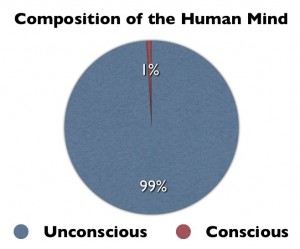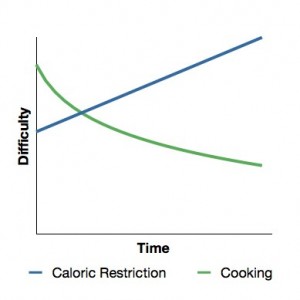
Who can be bothered to learn how to cook?
I mean, most cookbooks could double as boat anchors. They contain hundreds (if not thousands) of instructions, all of which seem to demand that you to track down obscure ingredients and learn some difficult new cooking technique.
The thought of learning how to prepare a few good meals seems OVERWHELMING when you consider how easy it is to just go through the drive through or pop a frozen dinner in the microwave.
…at least that’s what you’ve always been led to think.
When learning how to cook healthy meals, most of us guys go about it all wrong. Tackling one recipe after another before giving up in frustration. But don’t fear, there’s still hope.
By learning how to harness the power of what I call “go-to meals,” you’ll be able to throw together tasty food with very little effort, ensuring that your fridge is always full of healthy food whenever hunger strikes.
But to do this, you need to get a basic idea of how your mind works and learn how to take advantage of it.
The Conscious vs the Unconscious
The concept of the unconscious and conscious minds has been found in many cultures since the distant past.
Psychologists such as Sigmund Freud and Carl Jung have done an excellent job at further fleshing out these concepts into how we now know them today.
The theory is that our mind is made up of two different smaller minds, which operate in different ways and provide different fuctions. The unconscious mind is huge and results in most of our behavior, and the conscious mind is tiny and produces fewer of our actions.

Here’s the “Cliff’s Notes” version:
- The unconscious mind consists of all our automatic instincts and habits.
- The conscious mind consists of the things that we do of our own will.
Confused? Let’s look at an example.
Let’s say that John is working out at the gym. He’s taking the “move smarter” motto to heart and is doing deadlifts, cleans, and presses. After his full-body workout, he is breathing heavily and his heart is racing. He’s sweating profusely and is chugging water like they’re pulling it off the market.
When doing intense exercises such as these, your body requires more oxygen than usual. This sends a signal to your brain that says, “you need to breathe in more and pump your heart harder” to top up the oxygen.
Additionally, your internal temperature starts to rise, but your body fights to equalize it by sweating to cool off. But this loss of water makes you thirsty so that you can replenish your water supply.
Now, all of these things are going on “behind the scenes,” and you don’t have to think about them. Your body takes care of it all on its own.
Sweating. Breathing. Heart pumping. These are all things that John’s unconscious mind is doing.
But let’s say that this is John’s first time exercising. Maybe he’s a freshman in college and is trying to avoid gaining the dreaded 15 pounds.
He’s now breaking his usual routine to do something he hasn’t done before. He has to start with little to no weight on the bar and watch his form in the mirror.
Since he’s deviating from what his body is trained to do he has to use his conscious mind.
Now, let’s assume that John sticks to a schedule and working out every Sunday, Tuesday, and Thursday at 7 am. After a month or two of this, it becomes much more natural for him to head out to the gym first thing in the morning. It’s now as much a part of his routine as taking a shower and brushing his teeth.
By repeating a conscious behavior enough times, he has transformed it into an unconscious one.
One thing I don’t see talked about enough in the health/fitness world is the psychology that comes into play here, in particular how the conscious and unconscious minds work with it or against it.
All too often we are told it is simply a matter of eating less and exercising more, and that if we fail to stick with these tough diets that make us go hungry it’s our own laziness to blame.
But many studies support the idea that it is food quality, not quantity, that leads to the easiest and most effective weight loss and maintenance.
Any time you do something that doesn’t come naturally to you, you are by definition using up your willpower, which you only have in limited quantities.
But when you do the things that come naturally, you don’t deplete your willpower. Your body has a literally infinite capacity to run these sorts of things on autopilot, from the regulation of your body temperature to your habit of checking email and Facebook every time you sit down at the computer.
Rituals–The 28-Day Path to the Unconscious
When you want to make a long-term change, you should look for ways to create automatic habits rather than neverending willpower-zapping actions.
This is why I’m not a big fan of most methods of caloric restriction, which is most promoted in mainstream health circles.
Trying to starve yourself will only work for a short time. There is literally no way to keep fighting off your innate urge to eat indefinitely.
Instead, you are much better off creating habits that work with your body. And the biggest win for most of us is learning how to cook a few healthy meals.
Yeah, I know. On paper you can still eat as many Calories of a given food as you can of another food. But studies suggest otherwise, and point to whole, unprocessed foods filling people up more than refined foods on a calorie-for-calorie basis.
And the best way to make something a habit is by doing it over and over again for at least 28 days.
Yes, it will take some willpower to get started, but the more you do it, the easier it becomes, and eventually it becomes as easy as tying your shoe. (You DO know how to tie your shoe, don’t you?)

Okay, that was rough. But here are the main takeaways:
- We all come with “prewired” programming in our unconscious minds. This cannot be changed no matter how hard we try. As humans, these are all pretty much the same between us.
- We also have a lot of habits that we learned over time that have been “uploaded” into the conscious mind.
- By repetition, you can transform conscious behavior into unconscious behavior… but only if you are trying to change learned habits rather than innate drives.
The Art and Science of Cooking
The reason so many people attempt to simply restrict calories on the foods they are already eating rather than simply try to change the kinds of foods they eat is as follows:
- Most people have been led to believe that the calories they eat vs they calories they exercise off are the only variables that matter.
- The people who WANT to eat better simply can’t stick with it due to the constant availability of cheap, tasty, and unhealthy foods.
- The only real way around this is learning how to cook yourself. And most people just aren’t gonna try something like that.
I’ll make no bones about it: learning how to cook will be difficult at first. It will require a lot of your willpower, the very thing I say you need to conserve.
In fact, at first it will be MORE difficult than just eating less of the same foods. And that’s the main reason most people favor it: caloric restriction is easier in the short term than learning how to cook.
But over the long term, cooking gets easier and easier (since you’re preparing the same meals), while caloric restriction gets harder and harder (because your body is gonna get the calories it wants, one way or the other).

Cooking is something you can easily make habitual. Yes, it’s gonna be a pain the first couple of times you try to prepare a dish. But it will become easier and easier, until you get to the point where you can make it without a recipe and can even substitute different ingredients to change things up.
Compare this with simple calorie cutting of the same foods you’re already eating, which will always leave you feeling hungry and sluggish no matter how long you stick with it.
The key is to select an easy meal that is full of unrefined foods such as meat and vegetables.
Gather your tools. Hit up the supermarket. Then clear out some time at home to cook the hell out of that stuff.
A Few Good Meals
And so, your template for automating your cooking should look something like this:
- Figure out a simple dish of meat and/or vegetables without sugar, flour, and vegetable oil that you could eat every week and not get sick of it.
- Find a simple recipe of that dish and follow it closely to prepare the food.
- Do this at least once a week for four weeks.
- Then try to make the meal without a recipe in front of you.
By this point, you should be able to make the meal from scratch without the recipe handy. (Especially if you make sure you don’t choose anything too fancy).
And at that point, you have your first Go-To Meal.
Once you’ve reached this milestone, add another meal into the mix, following the same process.
If you are cooking in bulk (which I highly recommend you do), after you’ve got 3-4 recipes down you’ll have enough to cover 90% of your meals for the week. (I always suggest you spend the remaining 10% eating out. It’ll keep you sane and make this a much easier plan to stick to.)
Once you are able to prepare about seven meals, give or take, you have reached the Jedi level of kitchen hacking.
At this point, you’ve got enough in your mental cookbook that you can switch things out and eat different meals each week.
This is the ultimate goal: to be able to make enough tasty meals each week that you never get bored or hungry, and have those meals be healthy enough that they support health and fitness without conscious calorie manipulation.
As an example, here are my go-to meals:
- Pot roast with mashed potatoes and gravy.
- Cottage pie.
- Roast chicken with roots and tubers.
- Baked salmon with rice and asparagus.
- The Epic Breakfast: Scrambled eggs, bacon or sausage, potatoes O’brien, yogurt, and seasonal fruit.
- Authentic Texas-style chili.
- The Man Salad: Basically any fresh raw vegetables I have on hand and hard-boiled eggs, cheese, or leftover meat.
- Grilled steak and veggies.
I don’t have to worry about consulting a cookbook ‘cuz I only ever make a small handful of meals. I just don’t have to sweat it.
The ingredients are simple enough that I can find them anywhere. They are relatively cheap as well.
It’s enough variety that I don’t get bored, but not so much that I have to keep a cookbook handy.
By having a handful of Go-To Meals under your belt, everything just works. (If I can steal a catchphrase from Apple.)
Do you have any go-to meals that you can throw together without breaking a sweat? Let the rest of us know!
 I'm a science geek, food lover, and wannabe surfer.
I'm a science geek, food lover, and wannabe surfer.
{ 6 comments }
Darrin,
Harnessing your unconscious mind to work with your health and fitness goals is really powerful stuff. I agree that everyone should have a few unprocessed go-to dishes that are easy to prepare in bulk. Lately, mine has been beef stew in a crockpot. This requires almost no effort and feeds me for a few meals.
Alykhan
This is an awesome article man! I really enjoy reading about how the human mind works.
I think having go-to-meals is important as we live in a world where time is of the essence and convenience is king. I think you only need 4-5 go-to-meals down to prevent yourself from leaning towards poor eating patterns.
Excellent review of the role of conscious and unconscious mind. As you say, it’s definitely not as prominent in health and fitness as it should be. 28 days to form a habit is what I’ve heard as well. It’s not as bad as people think…and once you get there, you’re golden. As for meals, I have a bunch of go-to meals for the week and let myself relax and enjoy on the weekends.
Very much agree with cooking your meals in advance. Makes it much easier to stick to a plan. My go to meal of choice is meatballs (grassfed 96% lean w/ spices only) with mashed cinnamon sweet potatoes.
Great explanation of how to use the conscious vs unconscious concept and apply it to diet and fitness… I’ve also noticed how great it is to have go to meals for those days where something fast is all that comes to mind.
@Alykhan
That’s def my favorite, too!
@Srdjan
Totally. People need far less variety in their diets than they think they’ll need to avoid boredom.
@Dave
Although it can vary depending on the size of the habit change, 28 days is definitely always a good rule of thumb.
@Tony
Sounds good! I might have to try whipping up a batch…
@Ahmed
Yeah, it definitely makes it a LOT easier to eat healthy when temptation strikes.
Comments on this entry are closed.